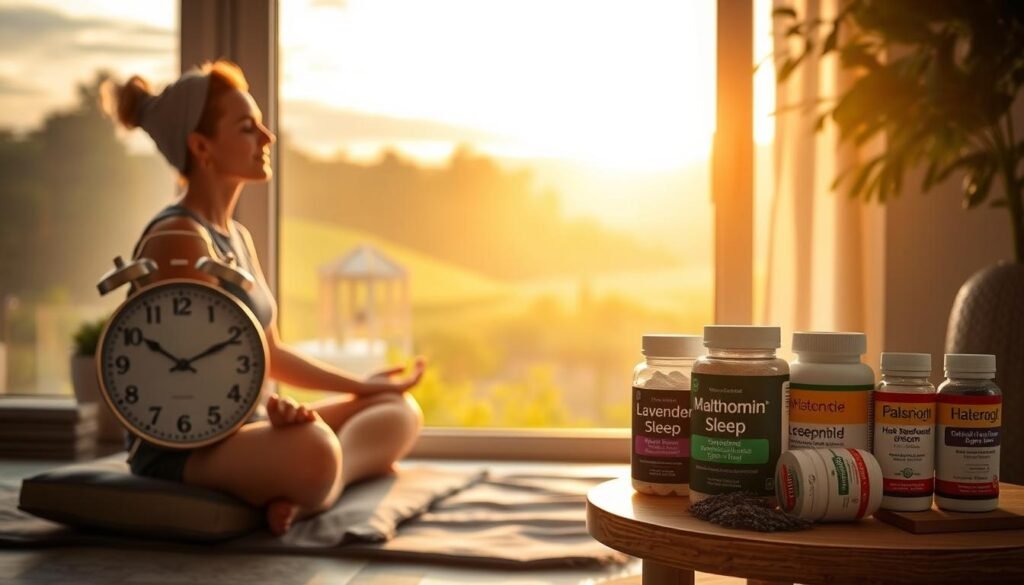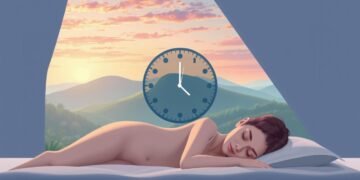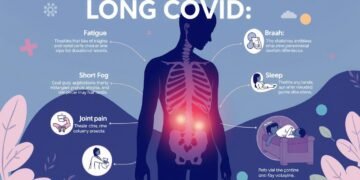Imagine being perfectly in sync with your body’s natural rhythm. You’re full of energy when you need it and rest when it’s time. Your circadian rhythm is like an invisible conductor, guiding your energy, sleep, and overall health.
Many people don’t know how much their circadian rhythm affects their daily life. It impacts everything from mental clarity to how your body works. Learning to work with your biological clock can greatly improve your health.
In this guide, we’ll dive into the science of circadian rhythms. We’ll see why they’re so important and share tips to align with your body’s natural cycles. Whether you’re dealing with sleep issues, want to boost performance, or just want to understand your internal clock, this article will guide you to better health.
Key Takeaways
- Circadian rhythm directly influences overall health and performance
- Your biological clock impacts sleep, mood, and metabolic processes
- Understanding your internal rhythm can improve daily functionality
- Lifestyle modifications can help optimize circadian rhythms
- Consistent sleep patterns are key for healthy rhythms
Understanding Circadian Rhythm: The Basics
Our bodies have an amazing internal clock that controls many processes. The circadian rhythm is like nature’s timekeeper. It makes sure our daily activities match the day and night cycle.
This incredible system does more than just help us sleep. It affects important things like:
- Hormone production
- Body temperature regulation
- Metabolism
- Cognitive performance
What Is Circadian Rhythm?
The circadian rhythm is our body’s natural way to keep a sleep-wake cycle. It comes from the Latin words circa (meaning “around”) and diem (meaning “day”). It happens about every 24 hours.
The Science Behind Your Body’s Clock
The suprachiasmatic nucleus (SCN) in our brain controls our daily rhythms. It’s in the hypothalamus. This small area gets light signals from our eyes. It helps our internal clock stay in sync with the world around us.
Our biological rhythms are like an intricat dance between our internal systems and the external world.
Knowing and listening to our internal clock can make us healthier. It can improve our sleep and how well we think.
The Importance of Circadian Rhythm for Health
Your body has an internal clock called the circadian rhythm. It’s key to keeping you healthy and feeling good. This system controls many body functions that affect your daily life.

How It Affects Sleep Quality
The sleep cycle is linked to your circadian rhythm. When it works right, it helps you stay awake during the day and sleep at night. But, problems with this rhythm can cause:
- Difficulty falling asleep
- Interrupted sleep patterns
- Reduced sleep quality
“Your circadian rhythm is like an internal conductor, orchestrating the complex symphony of your body’s daily functions.” – Sleep Research Institute
Impact on Mental Health
A good circadian rhythm is important for your mind. Consistent sleep patterns help keep your mood stable, lower anxiety, and boost brain function. But, if your internal clock is off, you might feel:
- Increased stress levels
- Mood fluctuations
- Decreased mental clarity
Connection to Physical Wellbeing
The circadian rhythm also affects your body’s health. It controls important functions like metabolism, hormone levels, and immune response. Staying on a regular sleep schedule can help with:
- Improved metabolic health
- Better hormone regulation
- Enhanced immune function
Learning about and supporting your body’s natural rhythms can help you stay healthy and feel your best.
Disruptors of Circadian Rhythm
Our modern lifestyle makes it hard to keep a healthy circadian rhythm. Knowing what disrupts our natural clock can help us stay well.

Our world is filled with technology that messes with our internal clock. Several things can really affect how we feel:
- Too much artificial light at night
- Blue light from screens
- Unusual sleep times
- Working shifts or traveling across time zones
Light Pollution and Its Effects
Artificial light is a big problem for our natural rhythms. Our bodies use light to know when to sleep and wake. But today, we’re always surrounded by light.
Nighttime light can lower melatonin levels, the sleep hormone. Lights from streets, screens, and homes can make us think it’s daytime. This makes it hard to sleep well.
Technology and Sleep Disruption
Digital devices mess with our sleep. Phones, tablets, and computers give off blue light that stops our bodies from getting ready for sleep.
- Blue light lowers melatonin levels
- Screen time late at night delays sleep
- Digital stuff keeps us awake and alert
Reducing light and making a tech-free zone before bed can help. It can fix your natural rhythm and make sleep better.
Benefits of Maintaining a Healthy Circadian Rhythm
Understanding your body clock can change your health and happiness. A well-regulated circadian rhythm brings many benefits. It helps with sleep and supports natural melatonin production, leading to better health in many areas of your life.

Enhanced Mood and Cognitive Function
A balanced body clock affects your mind and emotions. When your circadian rhythm is in check, you might notice:
- Sharper memory and concentration
- Reduced risk of mood disorders
- Increased mental clarity
- Better emotional regulation
Consistent melatonin production helps keep your mood stable. Studies show people with a regular body clock solve problems better and feel less tired.
Improved Metabolism and Weight Management
Your body clock is key to how your body works. A well-aligned circadian rhythm can help with weight by:
- Regulating hunger hormones
- Optimizing nutrient absorption
- Enhancing metabolic efficiency
- Supporting healthy energy expenditure
Eating at the right times can greatly affect your weight and metabolism. Listening to your body’s natural rhythms helps you use energy better and manage your weight.
Practical Tips to Regulate Your Circadian Rhythm
Optimizing your circadian rhythm is key for health and well-being. Learning how to support your body’s natural clock can boost your energy, sleep, and mental focus.

Managing your circadian rhythm needs a holistic approach. This involves several lifestyle changes. Let’s look at practical ways to improve your body’s natural rhythms.
Establishing a Consistent Sleep Routine
Having a reliable sleep schedule aligns your circadian rhythm. Here are some key tips:
- Set a fixed bedtime and wake-up time, even on weekends
- Create a relaxing pre-sleep ritual lasting 30-45 minutes
- Reduce screen time at least one hour before bed
- Maintain a cool, dark sleeping environment
Nutrition’s Impact on Circadian Rhythm
Your diet greatly affects your body’s internal clock. The timing and type of meals can impact light exposure and metabolism.
- Eat meals at consistent times daily
- Avoid heavy meals close to bedtime
- Choose nutrient-dense foods that support metabolic health
Incorporating Natural Light Exposure
Natural light is a powerful tool for a healthy circadian rhythm. Sunlight resets your body’s internal clock and improves sleep-wake cycles.
- Spend 15-30 minutes outdoors in morning sunlight
- Use bright light therapy during winter months
- Minimize artificial light in the evening
By using these strategies, you can effectively support and regulate your circadian rhythm. This leads to better health and well-being.
The Role of Exercise in Circadian Rhythm
Exercise is key in keeping our daily rhythms in check. It helps our biological clock work better. Knowing how exercise affects our body cycles can boost health and performance.

Physical activity affects our body’s timing. The type of exercise and when we do it can either help or mess with our natural rhythms.
Best Times to Exercise for Optimal Benefits
When you work out matters a lot. Studies show certain times are better for our energy levels:
- Morning workouts can reset your circadian rhythm
- Afternoon exercise may boost metabolism
- Early evening activities can improve overall fitness
Types of Exercise to Consider
Not all exercises are the same for our daily rhythms. Different activities offer unique benefits for our internal clock:
- Aerobic Exercise: Helps regulate sleep patterns
- Strength Training: Supports metabolic health
- Yoga: Promotes relaxation and rhythm alignment
Consistency is key when using exercise to support your biological clock.
By adding physical activity to your routine, you can improve your body’s natural rhythms. This boosts overall well-being.
Understanding Chronotypes and Personalization
Your internal clock is more than just a simple timekeeping mechanism. Each person has a unique sleep cycle that affects their energy, productivity, and well-being. Chronotypes show why some people are morning people and others are night owls.

Knowing your chronotype can change how you live your day. It’s about understanding your natural rhythm. This rhythm is linked to your genes and affects your mood, health, and how productive you are.
What Is a Chronotype?
A chronotype is your body’s natural sleep and wake times. Scientists have found four main types:
- Bears: Sync easily with the solar cycle
- Lions: Early risers with peak morning energy
- Wolves: Night owls with late-night creativity
- Dolphins: Light sleepers with irregular patterns
Tailoring Your Schedule to Fit Your Natural Rhythm
Knowing your chronotype helps you plan your day better. It can make you more productive, sleep better, and feel less stressed.
| Chronotype | Peak Productivity Hours | Recommended Sleep Schedule |
|---|---|---|
| Bears | 10 AM – 2 PM | 11 PM – 7 AM |
| Lions | 8 AM – 12 PM | 9 PM – 5 AM |
| Wolves | 5 PM – 9 PM | 12 AM – 8 AM |
| Dolphins | 10 AM – 2 PM | Varies |
By respecting your natural sleep cycle, you can reach your full capacity. It helps you create a daily routine that fits your unique rhythm.
The Relationship Between Circadian Rhythm and Mental Health
Mental health and our body’s internal clock are closely linked. Our sleep-wake cycle affects how we feel and handle stress. Knowing this can help us keep our mental health in check.

Our body’s internal clock, or circadian rhythm, controls many psychological processes. When it’s off, it can lead to anxiety and stress.
Circadian Regulation and Anxiety
Anxiety can grow when our internal clock gets out of sync. Studies show that irregular sleep can make anxiety worse by:
- Increasing cortisol production
- Disrupting neurotransmitter balance
- Reducing emotional resilience
- Impacting cognitive processing
Strategies for Managing Stress
There are ways to fix your internal clock and reduce stress:
- Consistent Sleep Schedule: Stick to the same bedtime and wake-up time
- Practice mindfulness meditation
- Limit screen time before bed
- Create a calming evening routine
By focusing on your sleep, you can boost your mental health and emotional control.
Nutrition’s Role in Supporting Circadian Rhythms
Your diet is key to a healthy biological clock. It affects melatonin production and your natural rhythms. Knowing how food affects your circadian system can improve sleep and well-being.

Foods That Promote Healthy Sleep
Some foods boost melatonin and support your biological clock. Add these sleep-friendly nutrients to your meals:
- Tryptophan-rich foods like turkey, eggs, and cheese
- Magnesium-packed options such as almonds and spinach
- Cherries and cherry juice for natural melatonin
- Herbal teas like chamomile and valerian root
Timing Meals for Optimal Rhythmicity
When you eat is as important as what you eat for your circadian rhythm. Your body’s metabolism is tied to specific times of the day.
| Meal Time | Metabolic Impact |
|---|---|
| Breakfast (within 1 hour of waking) | Activates metabolism, regulates blood sugar |
| Lunch (midday) | Supports energy levels, maintains biological clock |
| Dinner (early evening) | Promotes better sleep, reduces metabolic disruption |
Plan your meals to regulate your biological clock and enhance health. Consistency is key in maintaining a balanced circadian rhythm.
The Influence of Environment on Circadian Rhythms
Creating a good sleep environment is key to healthy sleep patterns. Your bedroom’s design and atmosphere greatly affect your sleep-wake cycle. It’s important to make a space that encourages restful sleep.

Knowing how light affects your sleep can change your nights. Our bodies react to environmental signals. Smart design can help control these natural rhythms.
Designing Sleep-Friendly Spaces
- Minimize blue light from electronic devices
- Use blackout curtains to control light exposure
- Maintain a cool room temperature between 60-67°F
- Invest in comfortable, breathable bedding
- Use soft, warm lighting in evening hours
Minimizing Nighttime Distractions
Reducing environmental disruptions is vital for consistent sleep patterns. Creating a calm, quiet sleeping environment tells your body it’s time to sleep.
- Use white noise machines to block unexpected sounds
- Remove electronic devices from the bedroom
- Create a consistent evening routine
- Use earplugs or noise-canceling mechanisms if needed
Your sleep environment is a powerful tool in managing circadian rhythm health.
By designing your sleep space with care, you support your body’s natural clock. This can lead to better sleep quality.
Tools and Resources for Tracking and Improving Your Rhythm
Modern technology has made it easier to understand and improve your circadian rhythm. Sleep trackers and mobile apps give you insights into your sleep patterns. They help you spot any disruptions to your natural rhythm.
Devices like Oura Ring, Fitbit, and Apple Watch track your sleep stages and heart rate. They also measure your sleep quality. This information is key to improving your sleep cycle.
Getting help from sleep specialists can be a big advantage. Experts at places like Stanford Sleep Medicine Center offer personalized advice. They use advanced tools to analyze your sleep and suggest ways to improve it.
Digital tools have greatly improved our knowledge of sleep science. Apps like Sleep Cycle and SleepScore use your phone’s sensors to analyze your sleep. They give you detailed reports and tips to better your sleep and overall health.
New technologies are changing how we monitor our body’s internal clock. Wearable devices and apps now offer detailed insights into your sleep. This makes it simpler to manage your circadian rhythm and boost your health.










































Discussion about this post